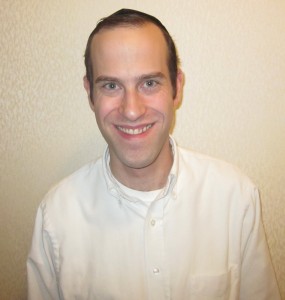Oct 8, 2014 By: admin

Dr. Moshe Miller (BR '14) recently completed his doctorate in modern Jewish history. We sat down with Dr. Miller to congratulate him on this accomplishment and for a chat about his experiences at Revel, his area of specialization, and what the future holds in store for Revel's most recent PhD graduate.
Revel News: What are Revel's strengths for graduate students in Jewish Studies? Dr. Miller: Revel has an extraordinary group of scholars who are experts in their fields and who devote their attention to helping students develop as scholars in their own fields of research. What makes Revel unique is the presence of scholars who, aside from their expertise in Jewish history and philosophy, have a thorough and sophisticated knowledge of rabbinic sources and how they can be utilized to understand Jewish history and thought. Furthermore, having access to the Mendel Gottesman Library, one of the finest Judaica libraries in the US, is an indispensable tool for conducting research in the field of Jewish Studies. The librarians are experts in their own right, and they are dedicated to helping students track down the sources they are seeking. RN: Who did you study with at Revel and what did you learn from them? DM: I had the good fortune to study with Professors Elisheva Carlebach, Jeffrey Gurock, Joshua Zimmerman, Daniel Rynhold, Joshua Karlip, Jess Olson, and Dean David Berger. Each of these scholars has broadened my knowledge of social, political and intellectual Jewish history as well as Jewish philosophy. In particular, Dr. Olson’s knowledge of modern European intellectual history has been of enormous help in orienting my own research. I have also been privileged to have participated in substantive discussions with Professors Ephraim Kanarfogel, Sid Leiman, and Yaakov Elman. One core idea that all of these scholars have taught me is the importance of general history and philosophy for contextualizing what the Jews were doing! RN: Who was your dissertation advisor and who was on your dissertation committee? DM: My advisor was Dean David Berger, whose expertise in Jewish-Christian relations was extremely helpful for my topic. The rest of the committee consisted of Dr. Jess Olson, Dr. Judith Bleich (Touro College) and Dr. David Ellenson (Hebrew Union College). Professors Bleich and Ellenson were brought in because they are preeminent scholars in the field of nineteenth-century German Orthodoxy. RN: What was the subject of your dissertation? DM: My dissertation is called “Rabbi Samson Raphael Hirsch and Nineteenth-Century German Orthodoxy on Judaism’s Attitude toward Non-Jews.” It examines the humanistic approach toward non-Jews that was developed by the leading rabbis of German Orthodoxy during the period when Torah im Derekh Eretz was the dominant religious ideology. I argue that the views of these rabbis must be understood within the context of the Jewish quest for emancipation in the late eighteenth and early nineteenth centuries. The emancipation project was incompatible with exclusivist conceptions of Jewish chosenness. German intellectuals, friends and foes of Jews alike, leveled the charge that Judaism preached a tribalistic ethic. The rabbis I examined, particularly R. Hirsch, vigorously refuted that charge, arguing that Orthodox Judaism consistently preached love and concern for all mankind. RN: What do you do now? DM: I currently teach Jewish history and Judaic studies at two New York campuses of Touro College, Lander College for Men and Lander College for Women. I have had the privilege to teach surveys of medieval and modern Jewish history, courses in Biblical exegesis (including the Books of Genesis, Leviticus, and Proverbs), and courses in Jewish history and thought such as “The Life and Works of Rabbi Samson Raphael Hirsch” and “Issues in Contemporary Jewish Thought.” I eagerly look forward to teaching an ambitious course called “Intellectual Trends in Rabbinic Judaism” next semester. RN: What are your plans for the future and are there any projects you are working on that you can share with us? DM: I intend to continue teaching. There is nothing like conveying to students the richness and diversity of Jewish history and thought and helping them understand issues that they have either not previously thought about or have not devoted sufficient time to examining in depth. I also am working on several research projects, and I look forward to presenting again at this year’s Association of Jewish Studies conference. My projects include an analysis of R. David Zvi Hoffmann’s writings concerning Christians and Christianity in light of late nineteenth-century attacks on the Talmud in Germany, an evaluation of R. Marcus Horovitz’s approach to non-Orthodox Judaism as rabbi of the Communal Orthodox synagogue in Frankfurt, a reappraisal of the dichotomy between German “Neo-Orthodoxy” and Hungarian “Ultra-Orthodoxy,” an examination of the form of Judaism that was taught at the early (pre-Schechter) Jewish Theological Seminary, and a reassessment of Eliezer Berkovits’ response to the theodicy question. Of course, my top priority is getting my dissertation published as a book! RN: Finally, what advice can you offer to current and prospective Revel students? DM: I recommend getting to know as many of Revel’s teachers as possible, as each has something unique to offer. Be in touch with Dean Berger throughout your studies. Although his specialty is medieval Jewish history, he knows just about everything! Finally, take advantage of all the symposiums and conferences that Revel sponsors or participates in. I have met several world-renowned scholars this way.